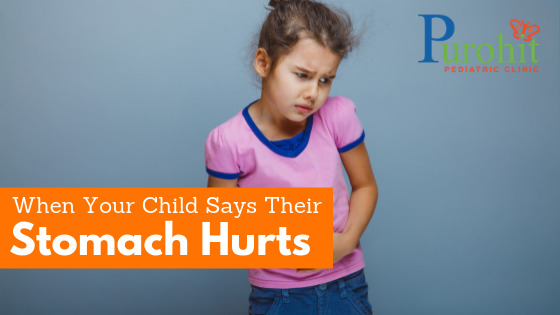When Your Child Says Their Stomach Hurts
JUNE 25, 2019

“My tummy hurts!”
As parents, we’ve all heard these three words at some point or another. Stomach aches are a common ailment among children, and though the culprit is usually benign, you ought to be able to recognize certain symptoms, especially those that require a doctor’s visit. So here are a few of the most common reasons your child might have a stomach ache, as well some tips on how to treat them.
Constipation
Constipation is extremely common among children and usually isn’t a cause for concern. However, it can cause some intense discomfort for your child.
More often than not, you’ll see constipation in children who either don’t drink enough water or don’t get enough fiber in their diet. Additionally, foods like cheese, meats, and white bread can also lead to constipation.
Other children may purposefully ignore the urge to go to the bathroom because they’re not home, don’t want to stop playing, or have anxiety about using the toilet (especially during potty training). Doing so can make bowel movements harder and more difficult later.
If you think your child has constipation, encourage them to take frequent trips to the bathroom (but be sure they don’t strain). You can also make sure they eat plenty of high-fiber foods, like pears, oatmeal, bananas, berries, apples, and carrots.
In some rare cases, constipation can be a sign of illness. If your child is constipated for weeks at a time, you need to consult with your doctor.
Viruses
Sometimes referred to as a “stomach bug” or “the stomach flu,” gastrointestinal viruses are another common cause of tummy aches in kids – especially those in daycare or school.
Most of the time, a stomach ache caused by a virus will be accompanied with nausea and diarrhea. Generally, you can care for this ailment at home. The most important thing is to make sure your child has plenty of fluids to stay hydrated. If, however, you child runs a high fever, doesn’t get better after a couple of days, or has excessive vomiting, call your doctor immediately.
Gas
For something so trivial and common, gas pain can feel like a knife in the gut, causing sharp pain and cramps in your child’s stomach. The good news, however, is that gas pain usually resolves itself – though sometimes it might be followed with a bout of diarrhea.
For babies and infants, you can help alleviate gas pain by rubbing their belly, moving their feet, or burping them. For older kids, try adjusting their diet and avoiding gas causing foods like beans, peppers, fried foods, and wheat. If your child is over 12, they may be able to take some over-the-counter medicines like Gas-X or Beano.
Appendicitis
Unlike other entries on this list, appendicitis – or the inflammation of the appendix – is a serious medical emergency that can be life-threatening if left untreated.
Appendicitis pain will usually appear on the right side of your child’s abdomen or around the belly button and then migrate after a few hours. The pain will get worse as time goes on, making it difficult for your child to move or walk. Because appendicitis can look similar to other stomach issues, it can be hard to make the call at home. That said, one of the “tell-tale” signs of appendicitis is rebound pain, which occurs after pressure is removed from the right part of the abdomen. Other symptoms may include a loss of appetite, low-grade fever, vomiting, diarrhea, and swollen belly.
With appendicitis, is ALWAYS best to err on the side of caution. Call your doctor immediately if you suspect your child might have appendicitis.
Stress
The world is a big, often confusing, place to children. Sometimes, it can be so overwhelming that it can cause stress and anxiety in our little ones, which may result in stomach pain.
If you think stress is causing your child’s stomach ache, there are a few things you can do. The first is to talk to them and comfort them. Try to find out the source of the stress. Is it school? A bully? Fear? From there, you can either remove the stressor or help them find healthy ways to deal with it.
Sometimes, the cause of stress may be harder to overcome. For additional help or advice, call your child’s doctor.
A Word To Parents
Parents, please understand, there are many, many different reasons your child could have an upset stomach. Most of the time, the cause is harmless and can be treated at home. The best things you can do is communicate with your child, keep an eye on the symptoms, and, above all, listen to your gut! If you’re worried about your child’s intestinal health, consult with your pediatrician.
